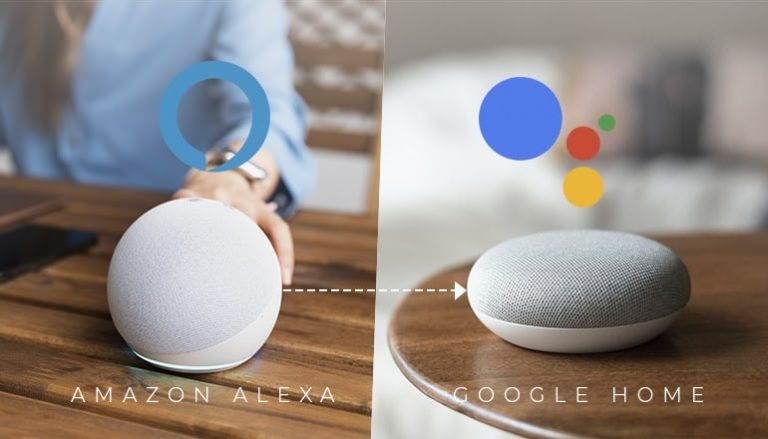Introduction: the voice-controlled home revolution in 2025
It’s 2025, and the dream of a fully voice-controlled home is no longer sci-fi — it’s reality. Whether you’re telling your lights to dim, asking your fridge for grocery updates, or making your robot vacuum clean up the popcorn you dropped during a Netflix binge, voice assistants are the glue holding it all together. But when it comes to building a seamless smart home, the battle of Alexa vs Google Home 2025 is fiercer than ever.
Choosing between Amazon Alexa and Google Assistant isn’t just about picking a speaker — it’s about choosing the ecosystem that will run your home. From smart home device compatibility to privacy controls, from speaker quality to AI-powered intelligence, the decision can make or break your futuristic household setup.
So, which is the best smart speaker 2025? Let’s dive deep into the smart speaker comparison 2025 edition and see who deserves the crown.
Alexa vs Google Assistant: the state of play in 2025
The Alexa vs Google Assistant debate has been going on for nearly a decade, and both companies have evolved massively since the first Echo and Google Home speakers. Here’s what defines the rivalry in 2025:
- Amazon Alexa: Known for its extensive smart home integrations and wide range of Echo devices at various price points.
- Google Assistant (Google Home/Nest): Famous for its natural language processing, search accuracy, and tight integration with Android and Google services.
But in 2025, the stakes are higher. Both companies are now leaning heavily on AI improvements, smart home automation 2025 trends, and tighter cross-platform integrations. The rise of Matter — the universal smart home connectivity standard — has helped level the playing field, but subtle differences remain.
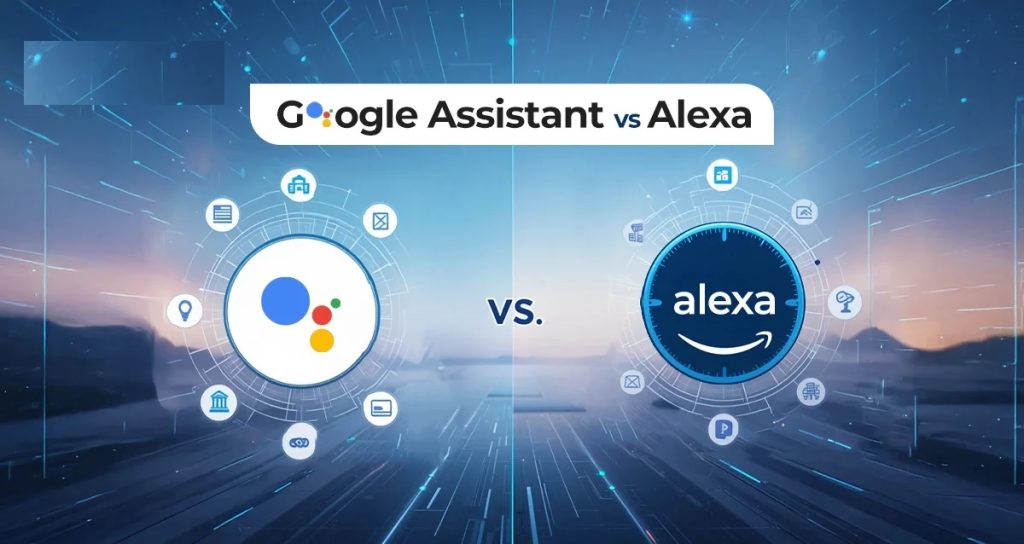
Smart speaker comparison 2025: hardware showdown
Let’s kick off with the best smart speaker 2025 contenders.
Amazon Echo lineup 2025
- Echo Sphere: Amazon’s new flagship, featuring spatial audio with 360-degree sound, enhanced bass response, and AI-optimized room calibration.
- Echo Dot (7th Gen): Small, affordable, and perfect for secondary rooms or office setups.
- Echo Show 15 Max: A massive smart display doubling as a kitchen TV, control hub, and AI-powered family planner. It now integrates recipe AI and health tracking.
Google Nest lineup 2025
- Nest Audio Pro: Upgraded bass, adaptive sound, and Dolby Atmos support make it a great choice for music lovers.
- Nest Mini (5th Gen): Compact, eco-friendly, and still unbeatable for its size. Now made from 90% recycled materials.
- Nest Hub XL: A central smart home dashboard with advanced gesture control, sleep tracking, and AI-driven routines.
Sound quality, design, and extras
Amazon Echo speakers traditionally leaned toward utility, while Google’s Nest devices focused on natural aesthetics. In 2025, Amazon caught up with sleek, fabric-covered finishes, while Google refined its eco-friendly designs. If you care about sustainability, Google has the edge; if you want variety, Amazon wins.
Verdict: In terms of hardware variety, Amazon still offers more options, but Google’s audio quality and eco-friendly materials have improved dramatically.
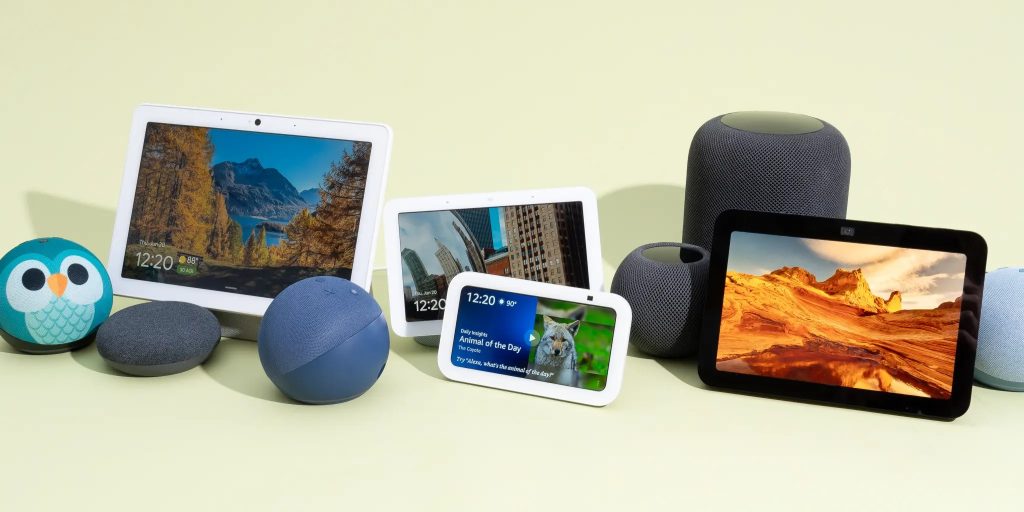
Best voice assistant for home: intelligence and AI
A smart speaker is only as good as the brain inside it. So how do Alexa and Google Assistant compare?
Alexa in 2025
- Strengths: Deep integration with Amazon services (shopping, Prime Video, Ring security cameras), great at smart home automation, and expanded AI routines that let Alexa anticipate needs (like adjusting thermostat before bedtime).
- Weaknesses: Still slightly robotic in casual conversations, and occasionally stumbles with context-heavy queries.
Google Assistant in 2025
- Strengths: Unmatched conversational AI, better at handling multi-part questions, and seamlessly integrated with Google Workspace, Maps, and Android devices. It now acts as a true digital butler, capable of managing travel itineraries, emails, and daily routines.
- Weaknesses: Fewer third-party skills compared to Alexa, and some advanced features remain region-locked.
Verdict: If you want the best voice assistant for home conversations, Google wins. For automation and device control, Alexa still holds the edge.

Google Assistant vs Alexa privacy: who’s listening?
In 2025, privacy is more than just a buzzword. Smart speakers are always listening for their wake word, but users now demand transparency.
- Amazon Alexa privacy features 2025: Amazon introduced on-device processing for common commands, auto-delete settings for voice recordings, and a new “Privacy Mode” light indicator that visually reassures users when the microphone is muted.
- Google Assistant privacy features 2025: Google expanded its Federated AI approach, meaning your assistant learns patterns without sending raw audio to the cloud. Quick-delete voice history with simple voice commands is standard, and Google has doubled down on local-only processing for sensitive commands.
Verdict: Google Assistant vs Alexa privacy is a close race, but Google’s AI-on-device focus gives it a slight lead for the privacy-conscious.
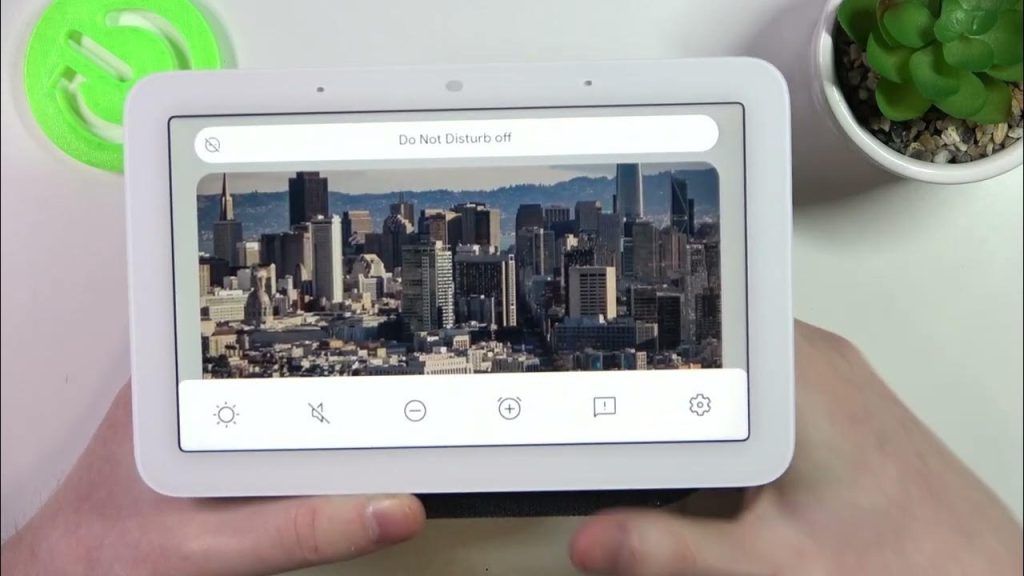
Smart home device compatibility in 2025
A voice assistant is only useful if it plays well with your gadgets. With the rollout of the Matter standard, cross-compatibility has improved dramatically.
- Alexa smart home compatibility: Works with nearly every major smart home device, including older Zigbee products. Amazon has invested heavily in bridging older devices into Matter.
- Google Home smart home compatibility: Equally strong with Matter devices, but older Zigbee/Z-Wave hubs may need a bridge, making it less ideal for those with legacy devices.
Examples of compatible devices in 2025:
- Smart lighting: Philips Hue, Nanoleaf, and IKEA’s smart bulbs work seamlessly with both platforms.
- Security devices: Amazon Ring integrates best with Alexa, while Google Nest Cams integrate perfectly with Google Home.
- Smart appliances: Samsung, LG, and Whirlpool all support Matter, giving users flexibility regardless of assistant choice.
Verdict: For broad smart home device compatibility, Alexa still wins thanks to its legacy support.
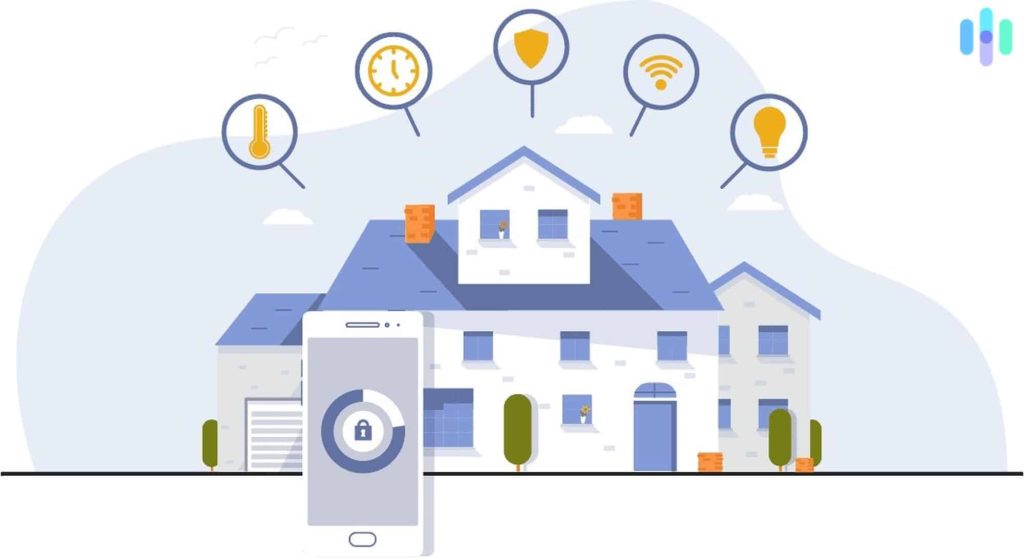
Voice controlled home setup: which is easier?
In 2025, both Alexa and Google have made huge strides in making setup painless.
- Alexa setup: The Alexa app now auto-detects most devices on your Wi-Fi, guiding you through a streamlined process. If you buy Amazon-certified devices, they auto-link upon installation.
- Google Home setup: The Google Home app integrates device setup with Android, allowing near-instant pairing for supported devices. Google also leverages QR code scanning for faster onboarding.
Verdict: Google makes the initial setup smoother, especially for Android users. But Alexa’s app is more robust for managing large smart homes.
Smart home automation 2025: routines and beyond
Automation is where the magic happens. Both platforms now offer advanced AI-driven routines.
- Alexa automation: Supports multi-condition routines (time, motion, geolocation, and even voice tones). Example: when you leave home, Alexa can lock doors, turn off lights, and arm your security system. Alexa Guard Plus now works with third-party security systems.
- Google automation: Uses AI predictions — if you always watch TV at 8 PM, it may auto-suggest dimming lights and powering on the TV without being asked. Google also integrates predictive travel alerts with your commute, automatically adjusting home climate settings.
Verdict: Alexa gives you control, Google gives you predictive convenience. Choose based on whether you prefer manual customization or AI initiative.
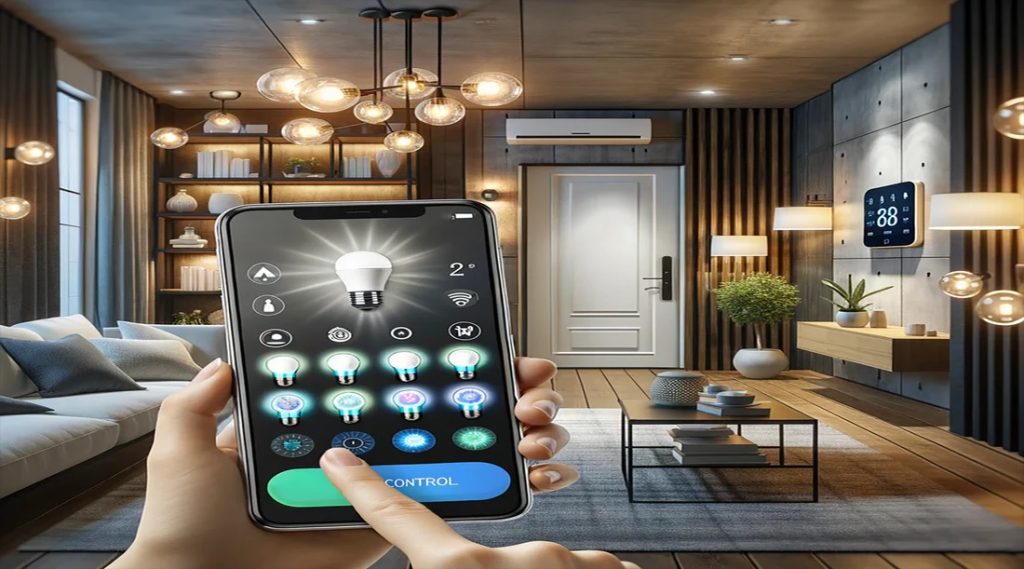
Real-life scenarios: Alexa vs Google in action
To make this more practical, let’s imagine a few day-to-day situations.
Morning routine
- Alexa: Wakes you up with your favorite playlist, brews coffee via a smart coffee maker, and gives you a weather update.
- Google Assistant: Reads your calendar, reminds you of traffic delays, and sends you a suggested route on Google Maps before you leave.
Movie night
- Alexa: Turns off the lights, lowers blinds, and launches Prime Video on your Fire TV.
- Google Assistant: Activates Theater Mode, dims lights, lowers thermostat, and queues up your saved YouTube watchlist.
Security check
- Alexa: Integrates seamlessly with Ring cameras and Echo Show displays.
- Google Assistant: Provides Nest Cam feeds directly on your Nest Hub or Chromecast.
Verdict: Alexa wins in Amazon-centric households; Google is perfect if you live inside the Google ecosystem.
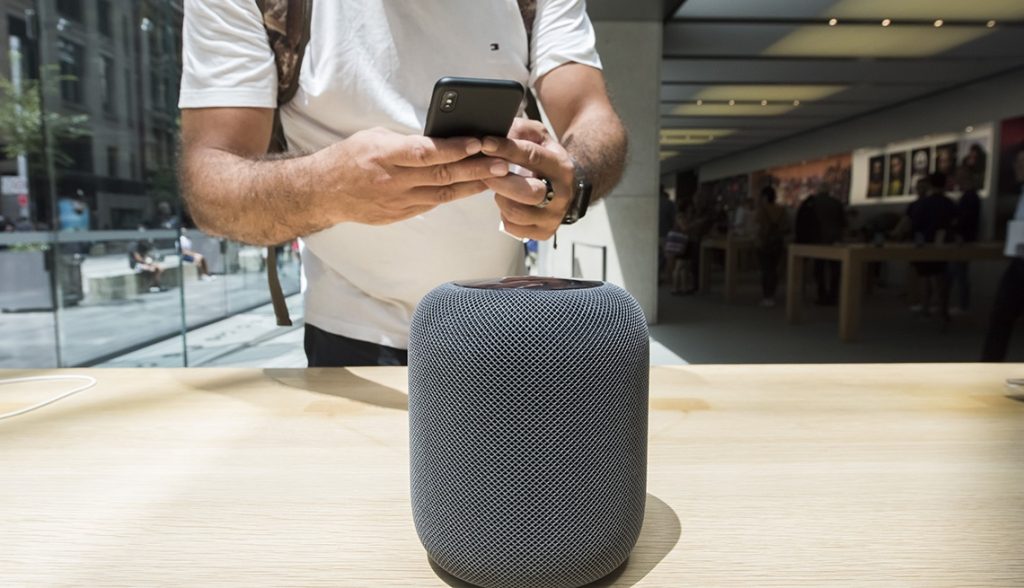
Cost and ecosystem investment
Smart speakers are no longer just standalone gadgets — they’re part of bigger ecosystems. The cost of choosing Alexa vs Google goes beyond the initial device price.
- Amazon Alexa ecosystem costs: Echo speakers are often more affordable, but users tend to invest in Ring cameras, Fire TVs, and Amazon services.
- Google Home ecosystem costs: Google speakers are slightly pricier, but they integrate deeply with Android devices, YouTube Premium, and Nest products.
If you’re already subscribed to Amazon Prime or YouTube Premium, your choice might naturally align with the ecosystem you already pay for.
The best smart speaker 2025: final verdict
So, who wins the Alexa vs Google Home 2025 battle?
- Choose Alexa if: You want maximum device compatibility, deeper automation customization, and a wide choice of Echo hardware.
- Choose Google if: You value conversational AI, seamless integration with Google services, and stronger privacy protections.
In truth, there’s no one-size-fits-all. Many homes even mix both ecosystems — though this can get messy. If you’re building your voice-controlled home setup from scratch, decide based on what matters most: control vs intelligence.
FAQs
- Which is the best smart speaker 2025 for music lovers?
Google’s Nest Audio Pro takes the crown with Dolby Atmos and adaptive sound, although Amazon’s Echo Sphere is close behind.
- Is Alexa or Google better for privacy in 2025?
Google Assistant slightly edges out Alexa due to its on-device AI processing and federated learning approach.
- Can Alexa and Google Home work together in the same house?
Yes, but managing two ecosystems can be confusing. Most users pick one platform for simplicity.
- Which has better smart home automation: Alexa or Google?
Alexa offers more detailed, customizable routines, while Google provides smarter predictive automation.
- What is the easiest way to set up a voice-controlled home in 2025?
Using Matter-compatible devices ensures both Alexa and Google Home can set up quickly with minimal fuss.
- Are third-party devices equally supported on both assistants?
Mostly yes, thanks to Matter. However, Alexa still works better with older devices that predate the new standard.

